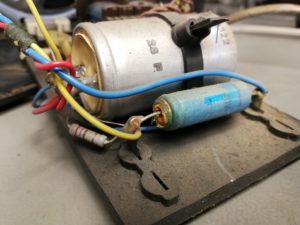![]()

In the years 1968 to 1970, the radio receiver was built with the inscription “Philetta Euro 280” by Philips. It is a small multi-band receiver with transistor equipment. The type designation 12RB280 / 30 with the inscription “Sonata” seems to be another version of this model. In any case, I have dug up the version “Sonata” – once again from the depths of the Kellergefilde – and after superficial cleaning connected to the mains. Immediately after switching on, the scale illumination lights up and a loud 50 Hz hum can be heard from the loudspeaker. Increasing the volume level adds some noise. So switched to the FM band and searched for a station – and lo and behold, it works. Only the buzzing disturbs. Otherwise, the device works without any major problems. To find the cause of the humming, you begin with the troubleshooting as usual in the power supply.

The rear panel is quickly removed and the power supply unit, consisting of a, mounted on a support plate transformer including rectifier and filter capacitors removed. Now, without using the oscilloscope and the multimeter, you can immediately see where the ravages of time have left their mark. The two electrolytic capacitors do not look quite healthy anymore.
 A quick measurement of the voltages brings certainty. The DC voltages have a decent ripple, which causes the “hum”. So the function of the electrolytic capacitors to smooth the DC voltage is no longer, or poorly, given. A measurement of the capacities confirmed that. So I renewed the capacitors.
A quick measurement of the voltages brings certainty. The DC voltages have a decent ripple, which causes the “hum”. So the function of the electrolytic capacitors to smooth the DC voltage is no longer, or poorly, given. A measurement of the capacities confirmed that. So I renewed the capacitors.

Immediately after switching on, even before I had the probe at the measuring points, a noise was heard without “humming”. The oscilloscope image now showed a clean DC voltage – almost no ripple. The receiver worked again very clean, without disturbing background noise. That was apparently the only mistake.
Technical information:
The main principle of the receiver is a superhet (according to the superposition principle) with an IF of 460/10700 kHz. The waveband of the receiver:

- long wave
- medium wave 1 (520-1400kHz)
- medium wave 2 (1400-1600kHz)
- shortwave
- UKW
The output stage has a power of 3W, which is converted into sound energy in a dynamic loudspeaker with permanent magnetic excitation. The case is made of plastic and has the dimensions 43×17.5×10.5cm with a weight of 2.4kg. The receiver is supplied with 220V / 50Hz mains voltage.